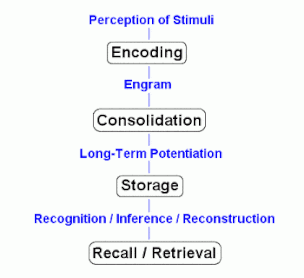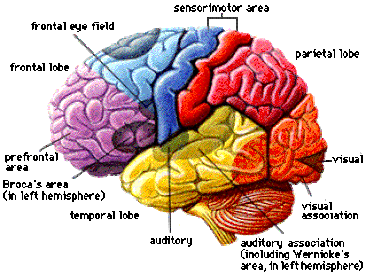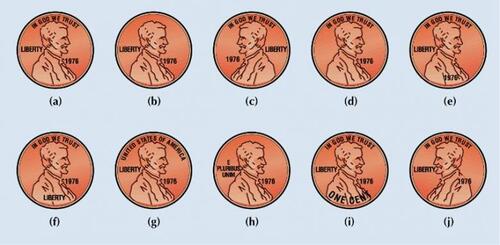MEMORY IS WHO WE ARE
Memories make up the ongoing experience of our lives. Our collective memories provide us with a sense of past, present, and future, and make us who we are. Memory makes fictional characters who they are as well.
Memory is not something you have, like eyes or hair you can touch, but the active process of remembering which involves encoding sensory perceptions, storing them, and recalling information. It is a brain-wide process made up of a group of systems that work together, but each playing a different role, in creating, storing, and recalling memories.
The notion of memory being like a filing cabinet in one location of the brain is no longer the current scientific view of what memory entails. As you learn and experience the world, and as changes occur at the synapses and dendrite, more connections in your brain are created. The brain organizes and reorganizes itself in response to your experiences, forming memories triggered by the effects of outside input.
As you learn and experience the world and changes occur at the synapses and dendrites, more connections in your brain are created. The brain organizes and reorganizes itself in response to your experiences, forming memories triggered by the effects of outside input prompted by experience, education, or training.
OH, MAN! HERE COMES THE BORING STUFF
Brain can process large amounts of information. How much depends on the source you're consulting, but all sources agree the brain can only register a limited amount of information taken in by our senses of sight, touch, sound, smell, feel (non-tangible such as mood).
If they are, they're shipped off to the various parts of long term memory. Much of it returns to the sensory cortex areas where the brain originally received it.

http://science.howstuffworks.com/life/inside-the-mind/human-brain/human-memory.htm http://www.human-memory.net/index.html
◄Image source: http://www.human-memory.net/index.html
● Long Term Memory -- If our long term memories are essentially who we are and what we believe in, then everything we see and do is filtered through that lens.
When three characters (or real people) walk into a room, they don't all see the same thing. Presumably all three will take in the gist of things without the details. Let's say they all perceive a large luxurious-looking dining room with a long table set for a dinner party, and soft music playing in the background.
See, that wasn't too bad, was it?
WHO WE ARE IS WHAT WE PERCEIVE
Because our brains only focus on a fraction of the details, our filters kick in. We tend to focus on those things that matter or are important to us as individuals. Although humans seem to rely more heavily on sight, remember that sounds, vibrations, touch, smells, and a general sense of mood are all processed through the brain in the same way.
Now, let's go back to the dining room scenario and imagine the three people entering the dining room are an architect, the wife of a diplomat, and a cellist who play in the local philharmonic orchestra.
The architect ogles the dome above the center of the table, thinking about the construction and the effectiveness of a dome. He/she may wonder about the effect of opening up parts of the dome to natural lighting.
| Image Source: castledesign.com/ceiling-domes | Image source: creativehospitality.blogspot.com |
What your characters notice and perceive is a way of describing for the reader what matters to the character and what interests and experiences they have.
SEEING IS BELIEVING
Have you ever used that cliché? Most of us have. Unfortunately, what people see and experience is not necessarily an accurate record of reality.
Our brains are good at taking in the general gist of things without taking in the details, particularly if you see the item, person, or scene frequently. This applies to all the sensory inputs although, as mentioned, humans rely heavily on sight. The brain, however, receives, processes, and stores information that the individual is not aware of at the particular moment.
On the History Chanel production of "Our Bleeped Up Brain," the host challenged people to pick out the picture of an actual penny (which is something we all see all the time) from several false images. See below.
Do you know off hand which is the correct depiction of the US penny? Respond to the blog with your choice of the correct coin...BEFORE you look at a real one.
Your brain recognizes who the person is from general indicators and fills in the details from memory (the way it has been seeing the person). It may take a while before you realize that she cut her hair or that he shaved off his beard.
So, seeing (smelling, hearing, touching, feeling or sensing) is not always believing. First, because a good story teller can get people to believe almost anything. Second, everything we see is filtered through our own individual values, beliefs, and our perceptions of what is important. Third, because the brain fills in the details.
The best illustration of not necessarily believing what you see, is an optical illusion.
| Impossible Penrose Rectangle ▲ Image Source: newopticalillusions.com/3d-chalk Illusive drawing by Humberto Machado ► Image source: newopticalillusions.com/3d-chalk |
Our minds can be tricked into seeing things that aren't there or are different than reality. This is the one I like the best. Below are two photographs of body painting by Craig Tracy.
Body painting by Craig Tracy - Image Source: http://craigtracy.com/?p=95

FLASHBACKS
People have flashbacks, just like characters in books. A flashback, in the more medical sense, it an involuntary memory in which an individual has a sudden powerful re-experiencing of a past event, like PTSD.
A flashback can be, to some people, like reliving the experience, particularly when it's a traumatic or highly emotional event. Most of the time, humans simply remember something about another time, place, event, or incident. That isn't like reliving the event or watching a movie, although it can evoke sounds, smells, and emotions.
First, to simply "recall" something, our memory/brain requires a retrieval cue or trigger. You have to see, hear, smell, or receive other stimulus that makes you pull that memory out of its storage places in your brain, partly because you may not have been aware of it when it went into storage.
Second, remembering is a process of reconstructing what may have happened based on the details your brain chose to store during the experience and, afterward, was able to recall. So those particulars which the brain didn't choose to store won't be there for you.
Third, the retrieval cue itself makes a difference what is recalled. The more specific the cue, the more complete the memory. But the cue can also influence the memory. Asking a person if he saw a car speeding away from a hit and run accident and, then, asking if he remembers the color of the car, may give you one answer. Asking if the person saw a red Ford speeding away from the accident will almost always get an answer that the person saw a red car, even if that wasn't the color.
So, the trigger itself may cause someone to reconstruct the memory incorrectly. I believe that's part of the reason many of us have selective memories.
.
Flashback and internal thinking are tools of the trade for writers. It's important to remember fictional characters have the same kind brain as we do. When a character thinks about how she first met her husband, it doesn't just come out of thin air while she's driving to work and worrying about the project she's working on, unless something triggers the memory.
"I CAN REMEMBER WHEN I WAS ONLY A YEAR OLD..."
One more thing about memories. It might be possible to remember something from when you were a year old, but not probable.
There are some rare incidents of people born with this ability which is called Hyperthymesia. People with Hyperthymesia remember an abnormally vast number of their life experiences – some say every day of their lives -- in great detail, as well as public events that are personally significant to them. However, there are only 25 people identified with this ability [who are known to science].
Image Source: momsmagazine.com/your-childs-feelings

Be sure your characters' memories and motivations from early childhood events are generally possible, unless you can explain why this individual is different than the norm.
WHAT'S YOU ANSWER TO THE PENNY QUESTION?
Write a comment giving the number of the correct image of the penny. Then go compare that to a real penny and see if you were correct.
◘
References
http://www.pbs.org/wgbh/nova/body/how-memory-works.html
http://www.history.com/shows/your-bleeped-up-brain/episodes
http://www.encyclopedia.com/topic/brain.aspx
http://usatoday30.usatoday.com/tech/columnist/aprilholladay/2007-03-12-memory-first_N.htm
http://www.human-memory.net/brain.html
http://www.encyclopedia.com/topic/brain.aspx
http://wiki.answers.com/Q/How_many_pieces_of_information_can_the_human_brain_process_in_one_second
http://www.ehow.com/how-does_5006337_human-brain-remember-things.html
http://www.willamette.edu/~gorr/classes/cs449/brain.html
http://home.comcast.net/~momtofive/SIDWEBPAGE2.htm
http://www.dailymail.co.uk/sciencetech/article-2659620/Memories-really-ARE-Researchers-uncover-brain-decides-remember.html?ITO=1490&ns_mchannel=rss&ns_campaign=1490
http://www.sciencekids.co.nz/sciencefacts/humanbody/brain.html
http://wiki.answers.com/Q/The_average_age_of_the_earliest_reported_memory_is_roughly_years_of_age
http://www.psychicsdirectory.com/articles/general-george-patton-and-reincarnation/
http://www.sciencedaily.com/releases/2014/01/140124135705.htm
http://en.wikipedia.org/wiki/Childhood_amnesia
http://www.human-memory.net/processes.html
2021 updates
http://www.newopticalillusions.com/illusions/3d-chalk-drawings/page/13/
https://depositphotos.com/5448880/stock-photo-3d-man-stacking-some-cardboard.html
http://creativehospitality.blogspot.com/2014/01/decorative-dinner-table-setting-ideas.html
https://www.pinterest.com/pin/289848925988009204/
https://www.dailymail.co.uk/sciencetech/article-8588167/Human-brain-limit-information-process.html
https://momsmagazine.com/emotional-contagion-catching-your-childs-feelings-when-you-use-parental-intelligence/
https://momsmagazine.com/emotional-contagion-catching-your-childs-feelings-when-you-use-parental-intelligence/







 RSS Feed
RSS Feed